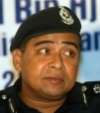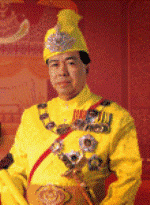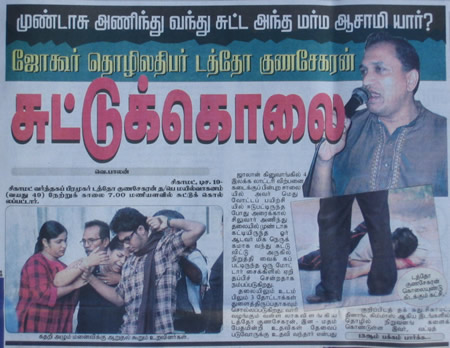
Zaid wants the government to stay faithful to the rule of law.
KUALA LUMPUR, Dec 20 — Since Umno booted out Datuk Zaid Ibrahim on Dec 2, the former de facto law minister has had strangers standing him meals.
Zaid, 57, told The Straits Times early this month at his home within a golf resort in Petaling Jaya: “Everywhere I go, I've got free roti canai. I go up to the cashier's and they say, 'Oh, somebody's paid for you'.”
He added, between chuckles: “In a funny way, that's probably the easiest way for them to say 'thank you'. It sort of reinforces your belief that you are on the right track.”
The right track, as he sees it, is urging the Malaysian government to be more open and transparent, and to stay faithful to the rule of law.
After the March 8 general election, in which the ruling Barisan Nasional coalition was dealt its worst results since 1969, Prime Minister Datuk Seri Abdullah Ahmad Badawi appointed Zaid as law minister. His task: to whip the country's legal system into shape.
But on Sept 16, the anniversary of Malaysia's founding in 1963, Zaid quit the Cabinet after the government detained three civilians under the Internal Security Act — without his knowledge.
Then, on Oct 31, Zaid spoke at a conference in Kuala Lumpur, where he said: “The Ketuanan Melayu model has failed. It has resulted in (the) waste of crucial resources, energy and time and has distracted (Malaysians) from the real issues confronting the country.”
Ketuanan Melayu means Malay supremacy, or the notion that the Malays should have special privileges because they are the country's original inhabitants. Zaid's remarks drew immediate condemnation from Umno's rank and file, with calls for him to be ostracised.
The final straw, it seems, came when Zaid attended two opposition events last month. It prompted Umno's supreme council to expel him for, as Abdullah put it, “going against the ethics of the party”.
In his interview with The Straits Times, Zaid looked dapper, albeit a little worse for wear, in a bright orange shirt and black blazer. That perhaps had less to do with his sacking from Umno than the 10-day-old ear infection he had been nursing.
He has vowed not to rejoin “the present Umno”, which he said practised double standards. He has, however, denied rumours that he would join the opposition Pakatan Rakyat coalition.
The son of Kelantanese farmers, Zaid became a member of Umno in 1985, then “got entangled” in politics so as to win back Kelantan after Umno lost all its seats in the state to the opposition Pas in 1990.
The former Scotch-tape salesman, who trained as a lawyer on a government scholarship, founded his law firm the same year he joined Umno, and made it Malaysia's largest, with offices in Singapore, Indonesia and Thailand. He has since sold off his share in the firm. “I needed the money,” he said.
The father of three now wants to help groom tomorrow's leaders. He set up My Future Foundation two months ago to build bonds among Malaysian youth through various artistic pursuits in the hope they will forge a Bangsa Malaysia.
When Penang Chief Minister Lim Guan Eng invited Zaid to his DAP dinner in the state last month, it did occur to Zaid that accepting the invitation might get him into trouble with Umno.
He recalled: “Guan Eng has always been very polite, very nice to me. So I said, 'Okay, I'll come.'
“And then they asked me to say a few words. And I said, 'Oh, no'. Of course, they were 99 per cent Chinese. But they were clapping and very happy. So I said a few words about Bangsa Malaysia, what I was trying to do with my foundation. I said, 'I got no job. I want you to help me achieve this success'.
“It was just a five-minute speech.”
At that very dinner, he got a call from Datuk Salehuddin Hashim, secretary-general of the Parti Keadilan Rakyat, a component of PR. Salehuddin, who used to bunk with Zaid in Kuala Lumpur 35 years ago, invited the former law minister to PKR's annual congress.
“I went, 'Oh, shucks, I am at a DAP function. It's not fair if I say 'no' to you',” recalled Zaid.
So he said “yes”, heard PR leader Datuk Seri Anwar Ibrahim speak at the PKR congress, and then left.
In hindsight, he was “obviously naïve” to have attended these opposition functions, Zaid said, although he had attended many Pas events when he was Umno's Kota Baru division chief in 2004.
On Dec 2, two days after the PKR congress, Umno's supreme council expelled him from the party. He learnt of his sacking via SMS.
But what rankles most with Zaid was that the party did not give him a chance to explain himself. “They didn't even ask me, 'Why did you go? What are you trying to prove?’''
Shrugging, he added: “This is a manifestation of Umno's fascination with power.”
That fascination with power — from throwing its weight around in government to slamming political opponents such as Anwar — has put Umno out of touch with the times, Zaid said.
“It's got the Malays thinking: 'Hey, wait a minute. This is not a party that represents us'.”
Pas, in contrast, is much more egalitarian, he said. “We may not like its pronouncements on lipstick or on whether concerts should be held, but in dealing with people's problems, they are more people-oriented.”
Thoughtful, witty and sanguine throughout this chat, Zaid bristled only when it was suggested he may have thrown in the towel on reform too soon by resigning as law minister
“No, no, no,” he said. “I felt that I couldn't do it, either because of my personality or my way of doing things, or my outspokenness. Because a lot of people also criticised me. They said, 'Zaid, you're trying to do too many things in too short a time.'
“But I said 'I only know how to do my way' — in the sense that I'm not young, I'm quite experienced in life, I know there are certain things either you agree or you don't agree.”
Among the biggest disagreements he had with his colleagues was one over the prospect of Umno having to abandon patronage politics so as to fight corruption effectively.
He said: “If I can give you this and that, if I want to keep that sort of system, then how do you fight corruption? It's completely contradictory.”
Might prime minister-in-waiting Datuk Seri Najib Razak roll out the necessary reforms when he takes the helm in March next year?
Zaid's view: “Najib's favourite line now is 'If you don't change, they will change you'... I hope he will do that although I am quite sceptical he can.”
He mused: “I hope he will do the right thing on the big issues.”
What worried Zaid was that the majority in Umno were now hardliners, perhaps in reaction to Abdullah's apparently weak and ineffectual leadership. They saw Malay supremacy as the most effectual stick to beat back any dissent against the government.
The problem with that approach, in Zaid's view, is this: “You cannot have peace and stability by force. And if you don't have peace and stability, then you don't have the economic ability to be productive and competitive. And the world doesn't deal with people like that anymore.”
He bemoaned the fact that over-confidence in the 1980s saw Umno veering from its early days of seeking consensus with the other races on major issues. “It was a simple formula of Umno being the major partner but always in consultation, always open to ideas, always able to keep the pieces together.
“Not by a show of power, or a show of strength, but by a show of magnanimity.”
Zaid on...
The problem with Umno today
“They see provocation, they see enemies everywhere.”
What his detractors say about him
“They say, 'Ungrateful Malay, you benefited from the system and now you criticise it' — you know, that sort of stuff. Some say I should not be a Malay. I don't know how that is possible... But it doesn't really hurt me that much.”
Being chummy with the opposition
“My problem is that I always don't view politicians from the other side as enemies. They're all my friends. (DAP veteran Lim) Kit Siang is my old friend and Anwar (Ibrahim) and everybody.”
Attending the opposition events that got him sacked
“I was merely being naive or being silly but they were my friends, what's wrong with that?”
Being kept in the dark over the sudden detention of three civilians under the Internal Security Act in September
“I read about it in the papers. I thought that, as a minister, especially when you describe me as a Minister for Law, you know, it's a bit embarrassing when I don't know anything about it.”
How much Malaysia has lost out to Singapore
“I was in school in Johor Baru in 1967, and I'd go to Singapore on a bus over the weekend. Singapore was then a shanty town, of no significance. But today, it is the pride of the world. If they can do it, why can't we?”
Why he thinks differently from most in Umno
“I did not join Umno when I was young, so I was not subject to much conditioning.”
Talk that prime minister-in-waiting Najib lacks fire in the belly
“Yes, exactly. He has never shown himself capable of enunciating something. He can sound good, but all prime ministers sound good at the beginning.”
Those who want a Malaysia for only Malays
“How do you benefit? In the first place, how do you let the Chinese go? Where do they go? Where do you send the Indians? Where do you send disgruntled Malays like me?”
Malaysia's future
“I worry that we will become a Fiji or Zimbabwe, that we will be dominated by a certain group using the machinery of government to keep control.”
His future
“I came from very meagre beginnings, and if I end up as a meagre person, that's okay, it's just back to where I was.” — Straits Times Singapore

 Kain rentang itu digantung pada pagar Sekolah Kebangsaan Pengkalan Balak, utara Melaka mengenai jemputan ke majlis perjumpaan bagi membincangkan isu-isu Melayu, termasuk mengenai ternakan babi, anjuran badan itu esok.
Kain rentang itu digantung pada pagar Sekolah Kebangsaan Pengkalan Balak, utara Melaka mengenai jemputan ke majlis perjumpaan bagi membincangkan isu-isu Melayu, termasuk mengenai ternakan babi, anjuran badan itu esok. Jurucakap Pewaris yang enggan dikenali memberitahu Malaysiakini hari ini, bantahan akan diadakan kira-kira jam 11 pagi di sebuah dewan di Hotel Samudera Riverside, Masjid Tanah selepas perjumpaan tersebut.
Jurucakap Pewaris yang enggan dikenali memberitahu Malaysiakini hari ini, bantahan akan diadakan kira-kira jam 11 pagi di sebuah dewan di Hotel Samudera Riverside, Masjid Tanah selepas perjumpaan tersebut. Pada 18 Oktober lalu, peniaga dan pengunjung menemui bangkai kepala babi di tepian Pantai Pengkalan Balak.
Pada 18 Oktober lalu, peniaga dan pengunjung menemui bangkai kepala babi di tepian Pantai Pengkalan Balak.







 But the truth is: the opposite to what Pak Lah said has taken place.
But the truth is: the opposite to what Pak Lah said has taken place.